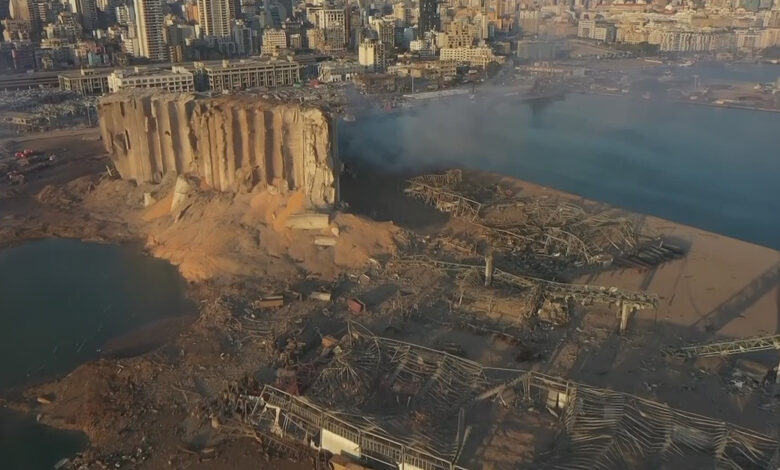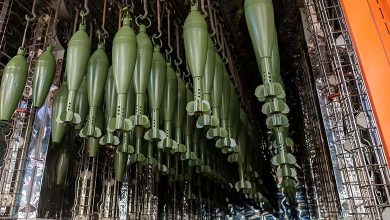The explosion of Beirut: A legal note since 2013 confirms that the ship discharged ammonium nitrate in the port

According to a verified legal note circulating online, explosive material, that may have been the cause of the destructive explosion in Beirut on Tuesday, had been stored in the port since 2013 after a tanker was impounded there.
Authorities have declared that a big quantities of the highly explosive ammonium nitrate were the cause of the destructive explosion that killed over 135 people and thousands have been injured in the capital of Lebanon on Tuesday, however, observers have asked where this material came from and why it was being stored in such large quantities close to central Beirut mostly populated.
According to a verified legal note from a Lebanese law firm, one theory has emerged that the explosion was caused by 2.750 tons of ammonium nitrate that was discharged by a Moldovan-flagged ship in 2013 and had been reserved in the port ever since.
Lebanese law firm Baroudi & Associates wrote a note after issuing three arrest orders against the Rhosus tanker, which was reserved by Lebanese authorities in November 2013 and thereafter discharged the ammonium nitrate in Beirut port.
The letter, which dated in 2015 and announced online by two lawyers from the firm acting on behalf of various creditors and contained details that what happened to the Rhosus after its Ukrainian crew and Russian owner abandoned the vessel off Beirut.
In the legal note published by the lawyers identified as Charbel Dagher and Christine Maksoud: On 23/9/2013, m/v Rhosus, flying the Moldovian flag, sailed from BatumiPort, Georgia heading to Biera in Mozambique carrying 2,750 tons of ammonium nitrate in bulk. In the way, the vessel faced technical problems forcing the Master to enter Beirut Port. Upon inspection of the vessel by Port State Control, the vessel was forbidden from sailing. Most crew except the Master and four crew members were repatriated and shortly afterwards the vessel was abandoned by her owners after charterers and cargo concern lost interest in the cargo. The vessel quickly ran out of stores, bunker and provisions.
Thereafter, a verification of the legal note has realized by Al Arabiya English after its initial publication in a newsletter published in October 2015 by ShipArrested.com, It’s a website that identifies itself as an extensive network that facilitates the fast and efficient arrest or release of ships with coverage in over 1.000 ports around the globe.
The two lawyers Dagher and Maksoud reported in their legal note after the ship was reserved by authorities: Many creditors came forward with claims against her. Our firm acting on instruction of these creditors obtained three arrest orders against the vessel. Efforts to get in touch with the owners, charterers and cargo owners to obtain payment failed.
A heatmap of the Rhosus cargo vessel, that according to the reports, discharged the 2.750 tons of ammonium nitrate at Beirut Port in 2013 and showed its past routes across the various countries in the Mediterranean prior to its abandonment in the Lebanese capital a year later, according to ship-tracking service Marine Traffic.
According to the same legal note, the two Lebanese lawyers Dagher and Maksoud declared that port authorities of Beirut had offloaded the cargo of ammonium nitrate onto the warehouses of the port.
Dagher and Maksoud draffed in the conclusion of the letter released in 2015: The vessel and cargo remain to date in port awaiting auctioning and/or proper disposal, whereas Al Arabiya English could not independently verify whether the 2,750 tons of ammonium nitrate that was discharged by the Rhosus in 2013 or 2014 was the cause of the destructive explosion on Tuesday at Beirut port from hanger 12.
Based on the information provided by Marine Traffic, the last recorded location of the Rhosus was located at Mediterranean at position 33° 54′ 18.036″ N, 35° 30′ 55.512″ E as more than six years ago on August 7, 2014. Moreover, the GPS coordinates placed the Rhosus docked exactly in face to the place which exploded on Tuesday at the port of Beirut.
Furthermore, the Rhosus sailed under the Moldovan flag, it was actually belonging to a Russian man named by Igor Grechushkin and was operated by a team of both Russians and Ukrainians, and based to an investigation realized by the Globe and Mail newspaper, Grechushkin’s known address was placed in Cyprus. The Siberian Times, Grechushkin is living in Limassol, Cyprus, and the newspaper publishing exclusive images corresponding to him.












